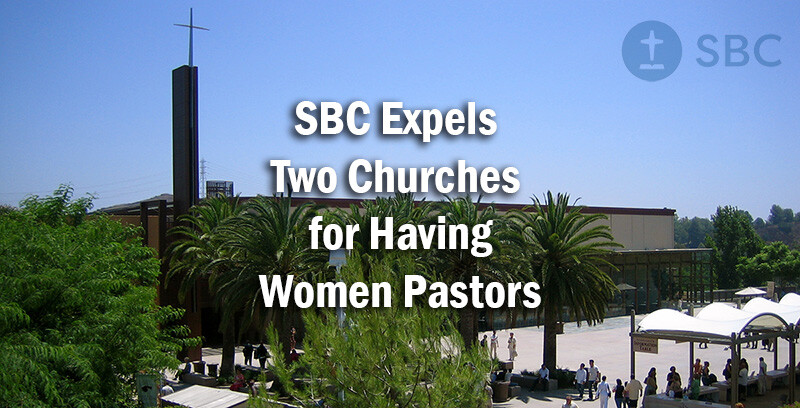
The largest church in the Southern Baptist Convention (SBC) was just expelled from the denomination on Wednesday, June 14th. Saddleback Church was removed from the SBC roster in early 2023, but the vote to uphold this expulsion was made official this week at the SBC Annual Meeting. The reason for Saddleback’s expulsion is due to having ordained three women as pastors which the SBC’s Baptist Faith and Message does not allow for. The most recent version of the SBC’s Baptist Faith and Message (amended to make this point explicit in 2000) says, “While both men and women are gifted for service in the church, the office of pastor/elder/overseer is limited to men as qualified by Scripture.” This has been the consistent interpretation of Scripture regarding women in ministry for the last 23 years.
Yet, it’s not always been applied consistently, and we know this because another church was expelled alongside Saddleback, also for having a woman pastor. Rev. Linda Popham from Fern Creek Baptist Church of Louisville, Kentucky, has been the sole pastor of the church for 30 years. Whether Fern Creek simply flew under the radar for the last 20 years, or if the SBC is just now finally cracking down on their beliefs, is not entirely clear. Despite the lack of clarity, two things are crystal clear.
First, it’s not shocking to see an evangelical denomination react to the current climate of political and social upheaval by becoming more conservative or more fundamentalist. In fact, it’s the exact pattern that can be observed in many institutions, both religious and political. Many people are evacuating away from the middle ground and moving toward the poles. There is a pervasive climate of fear and deep suspicion, especially in evangelical circles, to be on the lookout for slippery slopes that might lead to “woke.” Dr. Albert Mohler, the president of the Southern Baptist Theological Seminary told The New York Times that women in ministry is “high on the list of contemporary concerns precisely because it’s one of the issues that has been a sign of creeping liberalism.”
Of course, most people recognize that slippery slope arguments are a logical fallacy, but it’s also simply unrepresentative of reality. The CGGC is a case in point, having started licensing women for ministry since the mid-1800s. Within our denomination, the ministry of women did not lead to “creeping liberalism.” If my own historical research is accurate, women were very influential in the CGGC’s push toward the temperance movement in the United States, which is pretty conservative, and a step further than most conservatives would be willing to go today.
Second, the SBC itself has historically had a relaxed polity that valued the independence of its churches. Like the CGGC, the SBC has long prided itself on not having creeds, or on requiring every member of the denomination to agree to every theological belief. It seems that churches have operated this way for a long time, which is potentially why The New York Times estimates that there could be as many as 2,000 women pastors in the SBC in some form or fashion. While it was by no means normative, or even accepted under the most recent edition of the Baptist Faith and Message, it also wasn’t actively targeted. Now, it seems, it is.
In light of last year’s SBC abuse scandal, which highlighted the denomination’s lack of any meaningful kind of accountability for their male pastors, and any meaningful care for the women abused, disqualifying women from ministry this loudly feels particularly tone deaf. And that opinion isn’t just from the perspective of an outsider like me. According to Christianity Today, Pastor Bob Bender from Colorado asked denominational leaders, “What does it say when we’re slow on the take on sexual abuse of women but quick on the draw to disqualify them from non-lead pastor roles?”
Meanwhile Rick Warren, the Lead Pastor of Saddleback Church, suggests that nearly 2,000 churches could be affected in the same way that Saddleback was. It probably seems like a drop in the bucket to a denomination with 13 million members worldwide, but in the midst of historic religious decline in the United States, kicking women pastors (and the churches that support them) out of the denomination seems ill timed, at least. Jesus made it clear, even in His day, “The harvest is plentiful but the workers are few.”
I know that everything that has come before has been rather harsh toward the SBC, but I don’t see this as some kind of denominational hit piece, although I do think the criticisms are obviously warranted. Instead, the aim is to make the case that, now, as ever, we need every qualified apostle, prophet, evangelist, shepherd, and teacher we can get our hands on. Also, it’s worth acknowledging that the case for women in ministry is, scripturally, a complex one. But that complexity need not scare people away. The many reasons for the CGGC’s support for women in ministry can be found in two different documents, our Here We Stand document, and in a report given and used as a resource about the topic here. In the CGGC, it’s already difficult to find enough pastors to fill our churches. Given the declining state of Christianity, and the desperate need that many people still have to hear the gospel, we need all hands together to preach the message of Jesus.
CGGC eNews—Vol. 17, No. 24





Login To Leave Comment